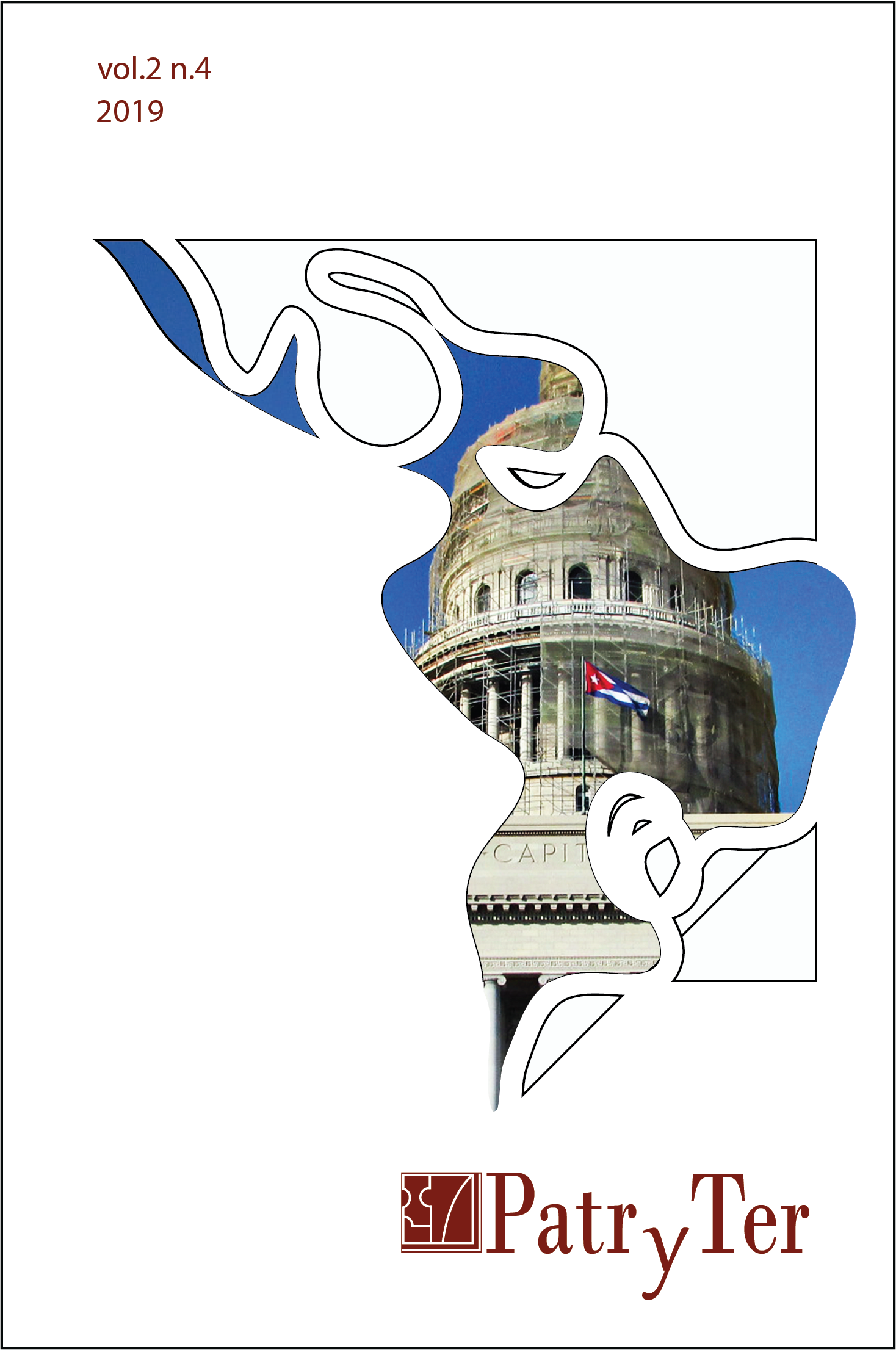Phenomenological approach to heritagization studies: Cultural Heritage(s)
DOI:
https://doi.org/10.26512/patryter.v2i4.22999Keywords:
cultural heritage. goods of formation. spiritual world. patrimonial valorization. affective evaluation.Abstract
The present article approaches a new way of conceiving the concept of Cultural Heritage, based on the Phenomenology. Subsequently, it presents part of the research results defended in the doctoral dissertation that had as a case of study the city of Sabará, in Minas Gerais State, Brazil. Starting from the tripartite vision of man - as body, soul and spirit - culture and value are categorized as spiritual, that is, as part of the highest facet of human existence. Therefore, heritage, in order to be cultural, must be related to man at his highest stage, in order to act as a good of formation, which has a transforming and humanizing role. The entire city of Sabará was sought to identify the cultural heritages actually existing, that is to say, those that represent the affective valuation of the inhabitants. Not all heritages inscribed, that is, derived from a patrimonial valorization process, are inserted in the spiritual world of the inhabitants of the city. Because of that, we catalog three types of cultural heritage: active, invisible and excluded.
Downloads
References
Assmann, Jan. Communicative and Cultural Memory. In: Erll, Astrid, and Ansgar Nunning. Cultural Memory Studies: Na International and Interdisciplinary Handbook. Berlin: Walter De Gruyter, 2008. p. 109-118.
BA.(2015).Experiências em Sabará.[Entrevista concedida à autora]
Bello, A. (2004). Fenomenologia e ciências humanas: psicologia, história e religião. Bauru: EDUSC.
Buarque, Sérgio c. Construindo o desenvolvimento local sustentável. Rio de Janeiro: Garamond, 2008.
Calvino, I. (2003). As cidades invisíveis. Rio de Janeiro: O Globo.
Choay, F. (2006). A alegoria do patrimônio. São Paulo: Estação liberdade/UNESP.
Costa, E. B. (2015). Cidades da patrimonialização global: simultaneidade totalidade urbana totalidade mundo. São Paulo: Humanitas, FAPESP.
Costa, E. B.; Brusadin, L. B.; Pires, M. C. (2012).Valor patrimonial e turismo: limiar entre história, território e poder. São Paulo: Outras Expressões.
CLD.(2015).Experiências em Sabará.[Entrevista concedida à autora]
Dardel, E. (2011). O homem e a terra: natureza da realidade geográfica. São Paulo: Perspectiva.
Dencker, A. (2012). Valor patrimonial: memória social e poder. In E. B. Costa; L. B. Brusadin; M. C. Pires. Valor Patrimonial e Turismo: limiar entre História, Território e Poder. São Paulo: Outras Expressões.
Dewey, J. (2010). Arte como Experiência.São Paulo: Ed. Martins Fontes.
EDR.(2015).Experiências em Sabará. [Entrevista concedida à autora]
Houaiss, A. (2001). Dicionário Houaiss da Língua Portuguesa. Rio de Janeiro, Ed. Objetiva.
NLD.(2016).Experiências em Sabará.[Entrevista concedida à autora]
Passos, Z. (1942). Entorno da história do Sabará. Belo Horizonte(Vol.1-Vol.2). Belo Horizonte: Imprensa oficial de Minas Gerais.
Rus, E. (2015). A visão educativa de Edith Stein. Belo Horizonte: Ed artesã.
Schama, S. (1996).Paisagem e memória. São Paulo: Companhia das Letras.
SLS.(2015).Experiências em Sabará.[Entrevista concedida à autora]
Stein, E. (2003a). Estructura de La persona humana. In E. Stein. Obras completas, IV, escritos antropológicos y pedagógicos. Madrid, ediciones El Carmen.
Stein, E. (2003b). Sobre el concepto de formación. In E. Stein. Obras completas, IV, escritos antropológicos y pedagógicos. Madrid, ediciones El Carmen.
Stein, E. (2003c). Fundamentos de la formación de La mujer. In E. Stein.Obras completas, IV, escritos antropológicos y pedagógicos. Madrid, ediciones El Carmen.
Stein, E. (2004). El problema de la empatia. Burgos: Ed. Monte Carmelo.Steiner, R. (2004). Teosofia: Introdução ao conhecimento suprassensível do mundo e do destino humano. São Paulo: Ed. Antroposófica.
Schultz, Alfred. Las estructuras del mundo de la vida. Buenos Aires: Amorrortu, 2003.
Schultz, Alfred. Sobre fenomenologia e relações sociais. Petrópolis, RJ: Ed. Vozes, 2012.
Yázigi, E. (2003). Civilização urbana, planejamento e turismo: discípulos do amanhecer. São Paulo: Contexto.
Downloads
Published
How to Cite
Issue
Section
License
Copyright (c) 2019 PatryTer

This work is licensed under a Creative Commons Attribution-NonCommercial-NoDerivatives 4.0 International License.
Please be advised that Revista Patryter is licensed under a Creative Commons Attribution-NonCommercial-NoDerivatives 4.0 International License (CC BY-NC-ND 4.0) https://creativecommons.org/licenses/by-nc-nd/4.0/deed.en
Authors who publish in the PatryTer Magazine agree to the following terms:
- Authors retain the copyright and grant the journal the right of first publication, the work being simultaneously licensed under the Creative Commons Attribution-NonCommercial-NoDerivatives 4.0 International License (CC BY-NC-ND 4.0) which allows the sharing of the work with recognition of the authorship of the work and initial publication in this journal.
- The contribution is original and unpublished and is not being evaluated for publication by another journal. When submitting the article, authors should attach as a supplementary document a Letter addressed to the PatryTer's Editor, indicating the academic merits of the submitted work (relevance, originality and origin of the article, that is, from what type of research]. This letter must be signed by all authors.
- The authors authorize PatryTer Journal to publish the article in public and private databases, in Brazil and abroad.
- Authors declare that they are fully responsible for the entire contents of the contribution that they submit to the Editorial Board of PatryTer Magazine.
- Authors declare that there is no conflict of interest that could interfere in the impartiality of the scientific papers submitted to the PatryTer Magazine Editorial Board.
- Authors are authorized to take additional contracts separately, for non-exclusive distribution of the version of the work published in this journal (eg publish in institutional repository or as a book chapter), with acknowledgment of authorship and initial publication in this journal.
Authors are allowed and encouraged to publish and distribute their work online (eg in institutional repositories or on their personal page) at any point before or during the editorial process, as this can generate productive changes as well as increase the impact and the citation of the published work (See The Effect of Free Access).



